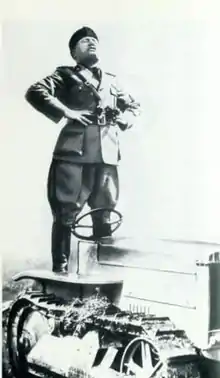Battle for Grain
The Battle for Grain was an economic policy undertaken by the Fascists in Italy during the 1920s as a move toward autarky.

Aims
Here are some of the policy's aims:
- Boost cereal production to make Italy self-sufficient in grain
- Reduce the deficit in the balance of trade
- Lower the necessity of foreign bread imports
- Show Italy as a major power
Actions
The policy was first put into practice in 1925 when high tariffs were placed on imported bread that were similar to the Corn Laws in United Kingdom during the 19th century. It was hoped that Italians would need to produce more of their own bread, instead of relying on cheap imports. Land that had not been used for years and was infertile was now used although it was very expensive to farm. The government also gave grants to those farmers who were producing crops to buy machinery and fertiliser.
Reference?
Impact
According to a 2020 study, the policy had the unintended persistent positive effects on industrialization and the Italian economy.[1]
See also
- Battle of the Lira
- Battle for Births
- Economy of Fascist Italy
References
- Carillo, Mario F. (2020). "Agricultural Policy and Long-Run Development: Evidence from Mussolini's Battle for Grain". The Economic Journal. doi:10.1093/ej/ueaa060.
- Fascist Italy by John Hite
- Mussolini by Denis Mack Smith
